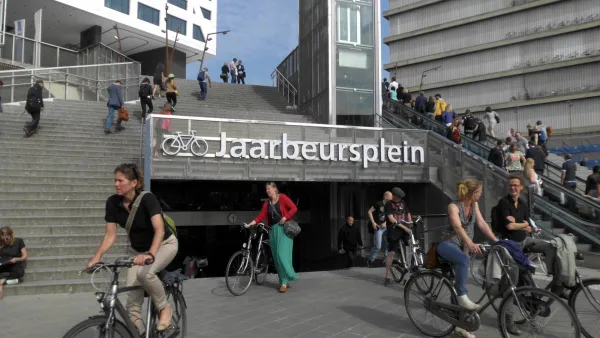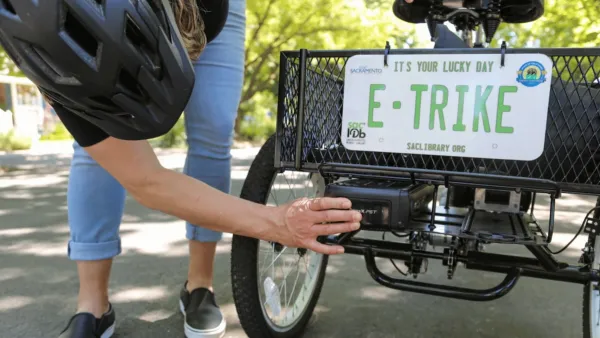Sometime in the last year – when the smart people in North America weren't looking – bike-sharing turned into a billion-dollar industry. I may be exaggerating when I say “industry.” But not “billion.”
Sometime in the last year – when the smart people in North America weren't looking – bike-sharing turned into a billion-dollar industry.
I may be exaggerating when I say "industry." But not "billion."
"Banks and private equity firms are eyeing a growth market for the bike industry," reports Bike Europe. "The money involved in such systems is huge. In return for the Paris Vélib system with its 1,451 rental stations and 20,600 bikes, JCDecaux obtained the rights to exploit 1,628 billboards in Paris. The company expects to realize € 600 million in advertisement turnover over the course of the 10-year contract." Cities all over the world are now looking seriously at public bike systems: London, Geneva, Barcelona, Rome, Beijing, Sydney.
About a decade ago, Vancouver contracted with JCDecaux to manage our bus shelters and street furniture in return for advertising rights on the shelters. Like most cities, we already allowed billboards to proliferate with zilch in the way of public contribution, and so can't lever them to finance a Velib-type system.
We're in danger of missing out as other cities take advantage of this new green economy. Columnist Thomas Friedman has been making this point repeatedly in the New York Times: "Being green, focusing the nation on greater energy efficiency and conservation, is not some girlie-man issue. It is actually the most tough-minded, geostrategic, pro-growth and patriotic thing we can do ." Climate change and the rising cost of crude are going to make green technologies the industries of the 21st century, and we're not yet taking them seriously.
And why? As Friedman says of our current leaders: "when it comes to making ourselves energy efficient and independent, and environmentally green - they ridicule it as something only liberals, tree-huggers and sissies believe is possible or necessary." Real men don't ride bikes.
This summer, a social policy analyst with the Netherlands government came to Portland, Oregon and Vancouver, B.C. to see what the Dutch might learn from us. (Yes, from us!) And what he discovered was the irony of our political culture: "Cycling in North America is clearly a leftist thing," reported Loek Hesemans, "although it ties in with conservative North American values like independence, freedom and the ability to manage for oneself." (You can read a lot more of Loek's observations in the current issue of Price Tags.)
And so common-sense activities that shouldn't be ideological are given a left/right slant and used to fight another battle in the culture wars. We end up blinding ourselves to opportunity – in the case of bike sharing, one that makes money while reducing greenhouse gases, that helps free us from oil shocks and car dependency, and pioneers a way of life that makes people in other places healthier, happier and richer, as we become vulnerable, fatter and poorer.

Maui's Vacation Rental Debate Turns Ugly
Verbal attacks, misinformation campaigns and fistfights plague a high-stakes debate to convert thousands of vacation rentals into long-term housing.

Planetizen Federal Action Tracker
A weekly monitor of how Trump’s orders and actions are impacting planners and planning in America.

In Urban Planning, AI Prompting Could be the New Design Thinking
Creativity has long been key to great urban design. What if we see AI as our new creative partner?

King County Supportive Housing Program Offers Hope for Unhoused Residents
The county is taking a ‘Housing First’ approach that prioritizes getting people into housing, then offering wraparound supportive services.

Researchers Use AI to Get Clearer Picture of US Housing
Analysts are using artificial intelligence to supercharge their research by allowing them to comb through data faster. Though these AI tools can be error prone, they save time and housing researchers are optimistic about the future.

Making Shared Micromobility More Inclusive
Cities and shared mobility system operators can do more to include people with disabilities in planning and operations, per a new report.
Urban Design for Planners 1: Software Tools
This six-course series explores essential urban design concepts using open source software and equips planners with the tools they need to participate fully in the urban design process.
Planning for Universal Design
Learn the tools for implementing Universal Design in planning regulations.
planning NEXT
Appalachian Highlands Housing Partners
Mpact (founded as Rail~Volution)
City of Camden Redevelopment Agency
City of Astoria
City of Portland
City of Laramie






























